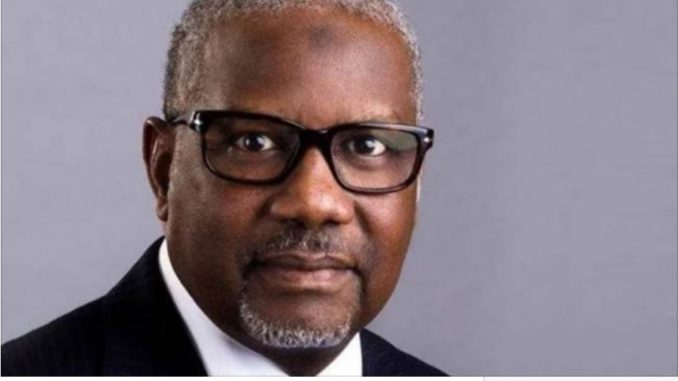
Nigeria’s borders with neighbouring countries have been shut since August with President Muhammadu Buhari saying the action was taken to curb smuggling.
There have been various reactions to the action. In this interview with TheCable, Mansur Ahmed, an executive director at Dangote Group and president of the Manufacturers Association of Nigeria (MAN), shares his opinion on the border closure as it affects manufacturers.
TheCable: We are at the Nigerian Economic Summit Group (NESG) to deliberate on how to move Nigeria forward. How do you suggest we go about it?
Ahmed: First of all, I think recognizing that if we are to transform this economy, we must industrialise and that industrialisation must be driven by the private sector. Government’s role should be to provide the environment in terms of policies, regulations, basic both soft and hard infrastructure, that is needed for manufacturing to thrive.
When the government does that, then it should actually leave the room for the private sector to invest, and also encourage and support and incentivize them where it is most needed. To compete with the giants, we must be bold in terms of what we do to create a strong and virile manufacturing sector in the country.
No economy thrives and rises to what you call the giants without first establishing a robust manufacturing sector that produces the goods and services that creates the jobs, that creates the opportunities for people to work, earn a living and generate wealth. I think investment must be carefully planned. We must be innovative in identifying where we need to invest and how much, but we also must be bold in terms of creating that opportunity.
SMEs are very vital as the providers of job. If you really want to unlock economic wealth and growth, you first identify key sectors where opportunities are and where your country is competitive. And find private sector investors who have the will and the courage to invest massively.
TheCable: The government has been trying to drive industrialisation and manufacturing with its recent policies. What is your take on that?
Ahmed: Policies, in general, need to be based on an in-depth assessment of the policy environment, consultation with the different sectors and stakeholders. Policies that come out of such a process are policies that are sustainable, that people can work with.
Secondly, we must avoid a kneejerk reaction. Thirdly, we must try as much as possible to move away from penalty as a basis for changing the behaviour. If you want manufacturers to behave in a certain manner, it is no use penalizing them if they don’t. It is more about incentivizing. Showing them how they can benefit by doing what you want them to do.
If you engage penalties, you discourage those who are not doing what you want and also those who may want to do the right thing. It is important that there is dialogue continuation between policymakers and the policy executers. So at the end of the day, the private sector can create a trade policy. So you must engage them and work with them to agree on the road map that everybody can contribute to.
TheCable: How are manufacturers taking the border closure?
Ahmed: Like the president said, indeed smuggling on a massive scale and particularly, import of substandard products and a lot of illegal importation harms the manufacturing sector very seriously. So it is right that the government should be looking at ways in which that can be curtailed.
I understand that the closure of borders is supposed to be a short-term arrangement to at least stop the massive hemorrhage of smuggled goods, particularly things like rice and so on into the country, while the government is looking for a more long term solution to the problem.
I believe that manufacturers will be willing to work with this arrangement for a time, but it shouldn’t be an indefinite thing because obviously if you close the borders, there are manufacturers who are genuine exporters whose businesses will be seriously hurt. There are also manufacturers who are bringing either raw materials or some of their inputs into the country and doing so legitimately. I think those people should not be penalised for too long.
I think the arrangement should be held sufficiently long enough to be able to put in place a long term more sustainable solution. The closing border is not a sustainable solution, I am sure we all know.
TheCable: The Manufacturers Association of Nigeria (MAN) expressed some reservations about the African Continental Free Trade Agreement. Have those concerns been addressed?
Ahmed: The AfCFTA is not going to rely only on a few key public administrators; it will require a broad-based coalition of both government and non-government stakeholders who are involved.
The president is setting up a national action team that is supposed to work and is supposed to be a multi-stakeholder action team that will continue to work in promoting and ensuring successful implementation of the AfCFTA and I am confident that if all the things that that committee is set up to do are done seriously, I think we should benefit tremendously from the AfCFTA .
Although it is a long term thing, not something people should look at in a year or two or three years. It is a major transformation of our economies in Africa and there is a lot more that has to be done. It is a trade revolution that has to be backed up by the infrastructure revolution.
TheCable: What should be done ahead of the AfCFTA implementation?
Ahmed: We must be able to create the infrastructure that facilitates and enables trade. There must be an industrial revolution, there must be an industrial capacity, to produce what we want to trade in across the continent and there must also be a financial revolution. We must find a way of ensuring that we create a financial environment that will help to make trade feasible and easy.
END

Be the first to comment